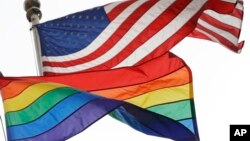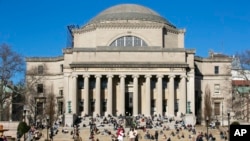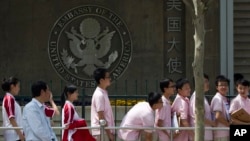Student Union
This Voter Group Could Sway 2020 Election

Ian Martens, a rising junior at Furman University in South Carolina, says President Donald Trump has “done a great job building our economy up,” and he likes the fact that Trump “stands up for Second Amendment rights,” or the right to bear arms.
“Most importantly, he is the most pro-life president,” Martens told VOA, calling that political issue for him “a debate between life and death.”
While the youth vote -- now the largest voting bloc in the U.S. -- is predicted to have a significant impact on the 2020 election, young white males like Martens may play an outsized role in determining the election.
Young white males “form a sizable and sometimes disproportionate swath of the American electorate,” reported the Center for Information & Research on Civic Learning and Engagement (CIRCLE) at Tufts University in Medford, Massachusetts.
Young white males came out in force in the 2016 presidential election: One million more young white males went to the polls and cast a vote than young white females, and they preferred Republican candidate Trump to Democratic candidate Hillary Clinton by 22 percentage points.
And two years later in the 2018 midterm elections, while the majority – 60% -- of young voters ages 18 to 29 identified with the Democratic Party, more than four in 10 young white men said they favored Trump, according to the Public Religion Research Institute (PRRI) is a nonprofit, nonpartisan research organization.
They voted more than Latino and Black men in the 2018 midterm elections, according to the Tufts analysis of 2018 Census Current Population Survey (CPS) data, and they make up a larger portion of the population in “some pivotal swing states like Iowa, Ohio, and New Hampshire,” CIRCLE reported.
Top issues
Priorities among young white male voters are “Make America Great Again and the gun rights movements,” according to CIRCLE.
“I support President Trump because he brought up issues career politicians have neglected for decades, from highlighting working-class men and women all across this country, addressing the needs of farmers to protecting national interests overseas,” Cody Steed, a member of College Republicans at Florida Atlantic University, wrote in an email to VOA.
“I feel that he truly cares for the progression and success of this country,” Steed said.
Gun rights are pivotal for many young voters. In 2018, 77 percent of young American voters said that gun control was an important issue in determining their vote, according to the Harvard Kennedy School Institute of Politics.
The anti-abortion movement is important to some young white male voters, as well. Overall, 46% of men overall oppose abortion, according to a 2019 Gallup poll.
“The pro-life debate is the most important ‘political’ issue in my opinion, because it is most directly a debate between life and death,” Martens said. “Each abortion is the ending of a life, so that is why I am most passionate about that because I am not in favor of ending precious babies’ lives.”
By comparison, the same poll found 43% of women overall identified as supporting abortion rights, with 62% between the ages of 18 and 29. Forty-six percent of these women identified as “total Hispanic or nonwhite.”
Young white men join the ranks of “disaffected, middle-aged, working-class white men [who] were credited with one of the biggest political upsets in American presidential politics,” VOA reported.
At a Trump youth rally in Phoenix June 23, young white men took the stage with President Trump, one of his adult sons, and several other lawmakers and officials – all older white males.
“What a day at the @TrumpStudents convention in Phoenix,” tweeted Twitter user @realRyanShear after the youth rally in Phoenix. “So many great speakers and stories. Young conservatives won’t back down to the leftist mob that wants to silence our freedom of thought and speech. #Trump2020”
One engine for young white men is S4T, founded in 2015 by Campbell University students Ryan Fournier and John Lambert, that has “over 5,000 volunteers, 280 chapters, and over 13,000 vote pledges,” as of October 2019, it states on its website.
Confidence to act
A 2018 study from CIRCLE showed that young white men’s “self-perceived civic efficacy was relatively high,” 39 percent of them hold a belief that they are “well-qualified” to engage in politics, a higher percentage than that of young white women or of young men and women of color.
Despite this, however, a majority of – 60% -- “young white men were the least likely subgroup of youth to feel heard by their elected officials.”
But these voters do not uniformly echo the concerns of older white men in the Republican Party.
A study done by Harvard Kennedy School Institute of Politics found that many young Americans support getting rid of the Electoral College as well as private health insurance. Additionally, a “majority” of those surveyed support background checks for assault weapons.
“I would also like Trump to support and advance bipartisan legislation protecting clean air and water, investment in infrastructure, and economic support for disadvantaged communities in the form of a system different than our current assistance programs.” Steed said.
“I would very much like to see advanced … his personal promise in 2016 to broaden the overall party to be more inclusive of same-sex marriage and individuals who identify with the LGBT community,” Steed added.
“We are blessed with tremendous freedoms because of our founders, and that is something to celebrate and love, and President Trump does,” Martens said.
A Virginia native, Martens hasn’t campaigned for Trump, but says he likes talking with friends about politics and hopes that “people can see my side of things and I can explain it with compassion and kindness.” What’s needed in the U.S. is a “cultural shift,” Martens says, such as a return to traditional religious values.
“A lot of conservative values are rooted in religion and religious principles and values, but as people move away from religion, we are losing the important aspects religion brings to our communities,” he said.
Conservatives not Republicans
Since the 2018 midterm elections, however, the president has faced criticisms for his handling of a variety of issues, including foreign interference in U.S. politics, but also the more recent coronavirus pandemic and protests caused by racial strife.
Among the critics are some conservative white males -- ardent conservatives or Trump supporters four years ago, but who now have taken to social media to explain how they’ve changed their mind in whom they will support this this election year.
“I want to say to every woman, Muslim, member of the LGBTQ+ community, minorities, victims of sexual assault, and many others, I’m sorry,” Zach from North Carolina said in a video tweet from @RVAT2020, who said he voted for Trump in 2016.
“You deserve so much more than a man who … enacts legislation that moves us backwards on social issues and individual liberty,” he said.
Trey, an 18-year-old from Texas, said he was “extremely excited to be able to vote for the Republican candidate to finally uphold the conservative values I’ve been raised with and that I believe in.”
“I’ve been waiting for this year for a while,” he explained in a video on Twitter.
“The Christian faith that Donald Trump claims to uphold is in no way, shape or form apparent in the way he acts. It’s all meant to be a facade to court the Republican vote, and his policies have steered what Republicanism and conservatism mean in a completely different direction than in what I believe in,” he said.
Trey said he would be voting for someone who “upholds character, leadership, the ability to court both sides of the political aisle. … and that is certainly not Donald J. Trump.”
"I do think that America can return to that shining city on a hill that (former President Ronald) Reagan once referred to us as,” tweeted @PrestonBrailer, who attends the University of Pennsylvania and describes himself as conservative. “But first, I think, Donald Trump and the current GOP leadership need to be voted out.”
See all News Updates of the Day
- By Dylan Ebs
International students find community during Pride Month

For LGBTQ+ international students, Pride Month, observed in June, is a unique time to reflect.
They hold on to multiple identities — both their LGBTQ+ identity and their cultural background — but coming to terms with them is not always easy.
For graduate student David Zhou, these identities can feel conflicting as transgender rights in China remain a controversial issue and spaces for LGBTQ people close. Zhou, 25, is transgender and pursuing an education in the STEM field at an urban university in the Midwestern United States.
VOA is using a pseudonym for Zhou’s first name and is not naming his university to protect his identity due to safety concerns back home in China. Zhou is not open about his transgender identity to his family.
During Pride Month, Zhou said he attended multiple LGBTQ+ events in his community and is surrounded by a supportive group of LGBTQ+ students who can relate to his experiences. But he’s not open about his identity to everyone on campus and said he doesn’t disclose his preferred pronouns to everyone to avoid transphobic comments.
“I feel like I have to make some judgments of the character of that person to see if they’re a good person to disclose [my identity] to,” Zhou said.
Zhou’s Pride Month celebrations included attending local markets with LGBTQ+ vendors and hanging out with his LGBTQ+ friends.
“They normalized being trans and for a long time I feel like trans identity is, should I say a vulnerability, brings me fear and worrying about discrimination, but having those events are helpful because it allowed me to see that queer people could just [live] openly,” he said.
At social events where few international students are present, Zhou said it can be tough to fit in.
“There's a lot of times like when they were talking about things I kind of, don't really understand, mostly because I kind of lack some background experience or knowledge,” he said.
Zhou said he is not aware of specific groups for LGBTQ+ international students at his university, but said international students are more prevalent in graduate programs and therefore find representation in organizations for LGBTQ+ graduate students.
In China, transgender individuals must obtain consent from an “immediate family member,” even for adults hoping to transition, which critics say limits the autonomy of transgender individuals while supporters say the policy protects doctors from violence by upset parents.
Struby Struble, a former coordinator of the University of Missouri LGBTQ+ Resource Center, told NAFSA: Association of International Educators in 2015 that LGBTQ+ international students face a “double barrier” on campus.
“With their international student friends, they feel isolated because they’re the LGBT one,” she said. “But then among the LGBT students on campus, they feel isolated because they’re the international one.”
Nick Martin, associate director of the Q Center, Binghamton University’s LGBTQ+ student support office, said when international students tour the center, there’s often a sense of hesitation as they enter a type of space that may not be present in their home country.
“I compare that to a year in after they've come into the space, they've again, maybe come to some of our events, they've got more connected,” he said.
Martin said graduate students have a unique interest in the Q Center as they may use the office for research and advocacy purposes that align with their studies.
“For older students, there may be hesitancy in a different way, but I think it's more in the vein of they want to do some of the advocacy work,” he said.
Martin said he thinks about how both his office and BU’s international student office can support students who come from countries with few — if any — protections for LGBTQ+ individuals.
“It's been a learning process of what those students really need, but I think I've kind of learned that a lot of students are just looking for the safe space that we offer,” Martin said.
- By VOA News
International students discuss US campus culture shock

International students at De Anza College in Cupertino, California, talked about culture shock in an article in La Voz News, the student newspaper.
"It felt like a major culture shock. Everything was so different, from academics to mannerism," said a student from Mexico.
Read the full story here.
These are the most expensive schools in the US

High tuition costs along with housing and food expenses can add up for students at U.S. colleges and universities.
MSNBC looked at the most expensive schools in the country, with one costing more than $500,000 for a bachelor’s degree. (June 2024)
Uzbekistan students admitted into top US universities

Students from Uzbekistan are among the international students admitted to top colleges and universities in recent years.
Gazata.uz profiled some of the Uzbekistan students attending Harvard, Brown, Princeton and other U.S. universities. (June 2024)
- By Stella Hsu
Reports of visa checks, deportations worry Chinese STEM students in US

Geopolitical tensions and growing competition in tech between the United States and China appear to be spilling over into academia despite commitments from the world’s two biggest economies to boost people-to-people exchanges.
The United States remains the top choice for Chinese students seeking to study abroad with nearly 300,000 studying in American colleges and universities during the 2022-2023 school year. But reports of some cases that students and professors are facing extra scrutiny while passing through immigration and the deportation of others are raising concerns.
For Chen Xiaojin, a doctoral student studying semiconductor materials at a university in the Washington, D.C., metropolitan area, it has been six years since she returned to her hometown of Beijing.
At first, it was the COVID-19 pandemic that kept her from going home. But over the past two years, she has been deterred by accounts of Chinese students majoring in science and engineering being required to reapply for their visas upon returning to China.
She also says she is worried by reports over the past six months of Chinese students being deported, even at nearby Dulles Airport.
"My current research is relatively sensitive, and my boss [adviser] is getting funds from the U.S. Department of Defense, making it even more sensitive,” she told VOA. "I am afraid that I won't be able to return after I go back [to China]."
Chen says that if she did return to China, she would have to apply for a new visa.
In a report late last month, Bloomberg said it had found at least 20 Chinese students and scholars with valid visas who were deported at U.S. Customs since November and barred from reentry. The U.S. Customs and Border Protection Agency does not release relevant data.
Immigration attorney Dan Berger represented one Chinese student who was deported late last year. He tells VOA Mandarin that the student studied biological sciences at Yale University and was about to complete her doctorate.
She visited her family in China and got a new visa but was deported by customs at Dulles Airport and barred from reentering the country for five years. Berger said he did not see anything suspicious in the transcript of the conversation between the student and the customs officer.
"We have seen what seems like a pattern over the last six months of Chinese PhD students being turned around…. more than I've seen in quite a while," he said.
Matthew Brazil, a fellow at the Jamestown Foundation, said neither country seems willing to explain the situation. However, he believes that in most cases, the United States must have valid reasons for blocking visa holders from entering the country.
In some cases, the student’s background may not match what is written on the visa application. In other cases, customs agents may also find something that the State Department missed, and once they see it, they are responsible for taking action.
"I wish the Chinese side would be specific about their students who were refused entry,” he said. “The fact that both sides are mum on details and that the Chinese side is engaged with the usual angry rhetoric means that each has security concerns. And that says to me that there was good reason for the U.S. to stop these particular applicants."
Brazil also sees a connection between the entry denials and export control regulations issued by the United States in October 2022 that restrict China's ability to obtain advanced computing chips, develop and maintain supercomputers, and manufacture advanced semiconductors.
U.S. Customs and Border Protection is one of the law enforcement agencies authorized to investigate violations of export control regulations, he said.
"Beijing's intelligence agencies are known to focus attention on PRC [People's Republic of China] students and scientists headed abroad who study or work on dual-use technologies controlled under the Export Administration Act — compelling Chinese students and scientists to report on what they've learned when they return to China on holiday,” he said. “This has been true for decades."
Bill Drexel, a fellow for the Technology and National Security Program at the Center for a New American Security, said the U.S. government did find some cases where students tried to steal strategic technology for China.
"I think it would both not be surprising that they found some really questionable or incriminating evidence for some students,” he said. “It would also not be surprising if, in their hunt for really solid evidence, they also may have made some mistakes on other students.”
Drexel adds that “it’s just kind of an unfortunate fact of the time that we live in and the tactics that the CCP uses when it comes to these measures."
In a post on X in early May, U.S. ambassador to China Nicholas Burns tried to dispel concerns about visas and entry to the United States for students and scholars. In the post, he said "99.9% of Chinese students holding visas encounter no issues upon entering the United States.”
In an interview with The Wall Street Journal Monday, Burns said it is China that is making it impossible to promote people-to-people ties. Burns told the Journal that students attending events sponsored by the United States in China have been interrogated and intimidated.
He also said that since U.S. President Joe Biden and China’s leader Xi Jinping held their summit in San Francisco last year, China’s Ministry of State Security and other agencies had interfered with Chinese citizens’ participation at some 61 events.
At a regular briefing on Wednesday, Chinese Foreign Ministry spokesperson Mao Ning dismissed those accusations, saying that they did not “reflect reality" and that went against key understandings reached by both countries’ presidents in San Francisco.
“The United States, under the pretext of 'national security,' unjustifiably harasses, interrogates, and deports Chinese students in the U.S., causing them significant harm and creating a severe chilling effect,” Mao said. “The image of the United States in the minds of the Chinese people fundamentally depends on the actions of the United States itself.”
Drexel said he believes Burns’ comments about visas and students' willingness to study in the U.S. still ring true.
“On balance, it's still the case that American universities are overwhelmingly warm towards Chinese students and want them in large numbers," he said.
However, Berger, the immigration lawyer, is concerned about the chilling effect recent cases involving Chinese students could have.
"In general, we are being more careful about advising Chinese graduate students in STEM fields about traveling and letting them know that there is some small risk,” he said.
Even though the risk is small, it does seem to be real at the moment, he said.
Adrianna Zhang contributed to this report.











